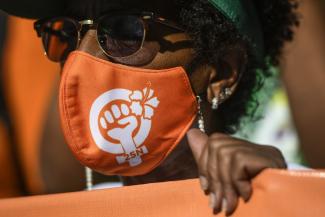Women’s rights
Dominican women want laws to protect them

The activists were upset because, a few days earlier, the Senate had approved the new penal code. The final decisions will now be made by the Chamber of Deputies.
Women’s-rights activists oppose various details. However, their criticism focuses on two issues: sexualised violence and abortion.
Articles 133 and 134 of the new code deal with rape and non-consensual sexual activity. The new law would foresee weaker punishment for the latter, with only four to ten years rather than 10 to 20 years of prison. So far, Dominican law has sanctioned both crimes equally.
In women’s eyes, the arguments of those who want the reform are appalling. For example, Eugenio Cedeño, deputy of the city La Romana, said in a press conference that one cannot punish a husband for taking off a condom even if his wife wants contraception with 20 years of prison. He said: “In the marriage contract, sexual consent is previously established.” Rogelio Genao, a senator, insisted: “You cannot punish or sanction a rape to a third party as you would with a person with whom you have a formal relationship”.
Women’s-rights activists insist, however, that it generally cannot be differentiated from rape. Refusing to use contraception, for example, only puts the woman at risk. She may indeed become pregnant against her will. Refusing to wear a condom is actually a form of exerting power.
Conservative politicians typically fail to acknowledge, moreover, that sexual abuse typically happens within an established relationship. According to the UN Population Fund (UNFPA), one out of 10 Dominican women becomes a victim of sexualised violence at some point in her life. In 80 % of the cases, the culprit is her actual or previous partner. The idea that rapists are strangers is therefore misleading.
The UNFPA figures probably do not tell the full story, however. UN Women reckons that internationally, one out of three women experience violence (both sexualised and domestic), and “fewer than 40 %” seek help of any sort. Quite likely, the 10 % figure for the Dominican Republic results from under-reporting.
Abortion rights
Abortion has always been illegal in the Dominican Republic. In recent months, however, civil-society groups have demanded the legalisation of therapeutic abortion, which means the right to end a pregnancy:
- when it poses a risk to the life of the mother,
- when the foetus has malformations incompatible with life or
- when the pregnancy is the consequence of rape.
Legislators, however, have not made these amendments in the proposed reform. Abortion opponents claim to be “pro-life”, arguing that ending a pregnancy amounts to murder. However, things are far more complex, as became evident in a famous example in the Dominican Republic. It is known as “Esperancita’s case”.
Esperancita was a 16-year-old girl who was diagnosed simultaneously with leukemia and a 7-week pregnancy in 2012. Doctors considered an abortion so she could undergo chemotherapy. However, since abortion is illegal, doctors could do nothing. Esperancita was not treated for leukemia, and neither she nor the unborn baby survived.
Women’s-rights activists, moreover, point out that an uncounted number of women die because of illegal abortions (see Virginia Caballero and María Lía Ghezzi on th D+C/E+Z platform).
The current penal code does not properly defend women’s basic right to self-determination. The proposed reforms would make things worse. Dominican women hope that the Chamber of Deputies will not approve the law passed by the Senate. They want to see legislation that does protect them.
Marjorie Pons Piñeyro is a student of Bauhaus University in Weimar. Her masters course deals with natural hazards and infrastructure. It is part of AGEP, the German Association of Post-Graduate Programmes with Special Relevance to Developing Countries.
marjorieponspi@gmail.com






